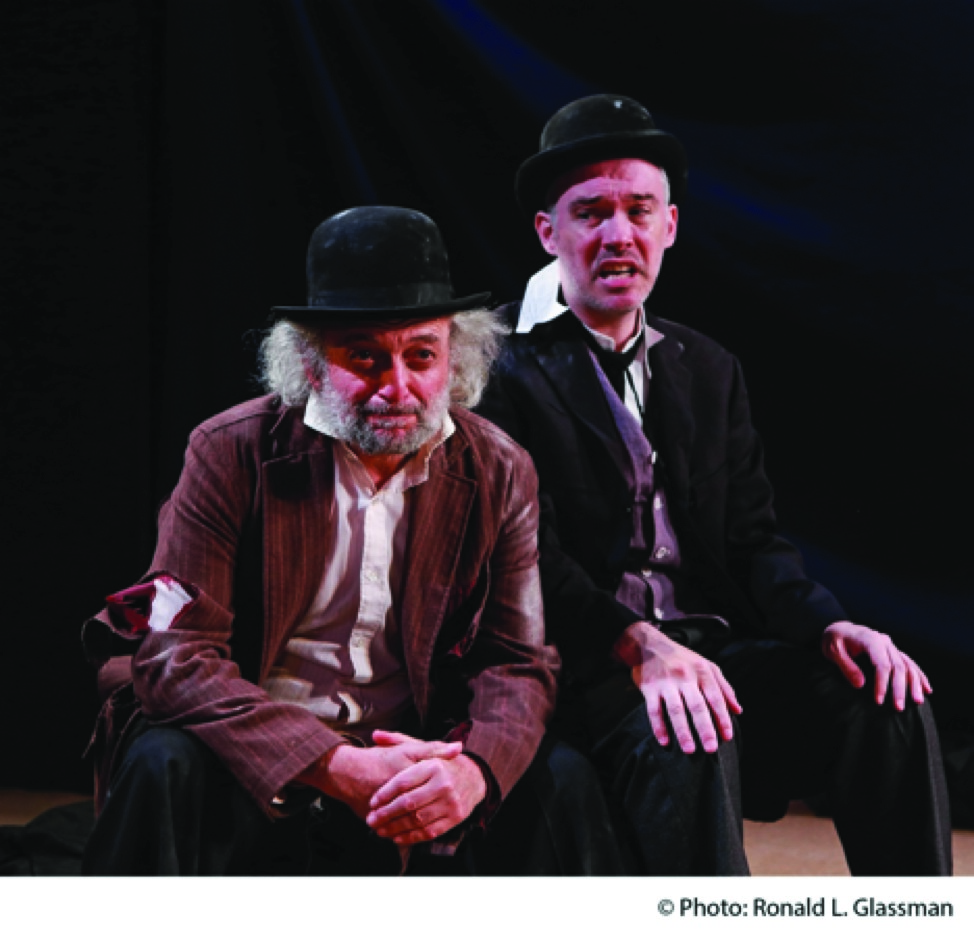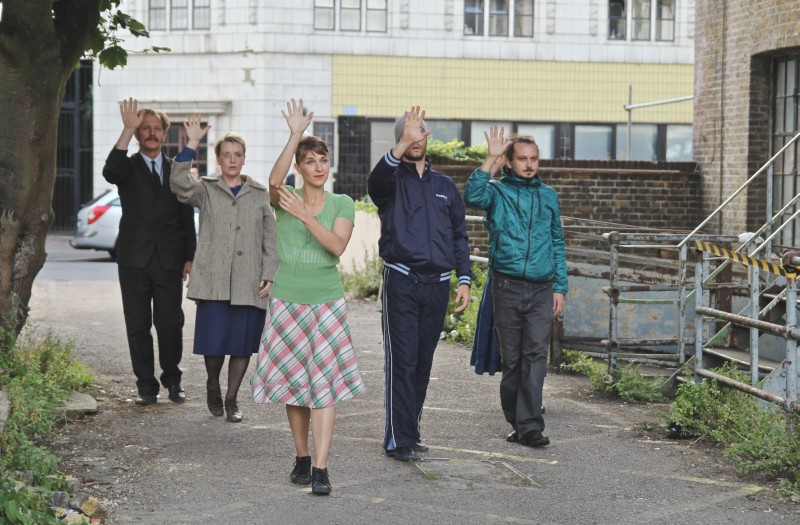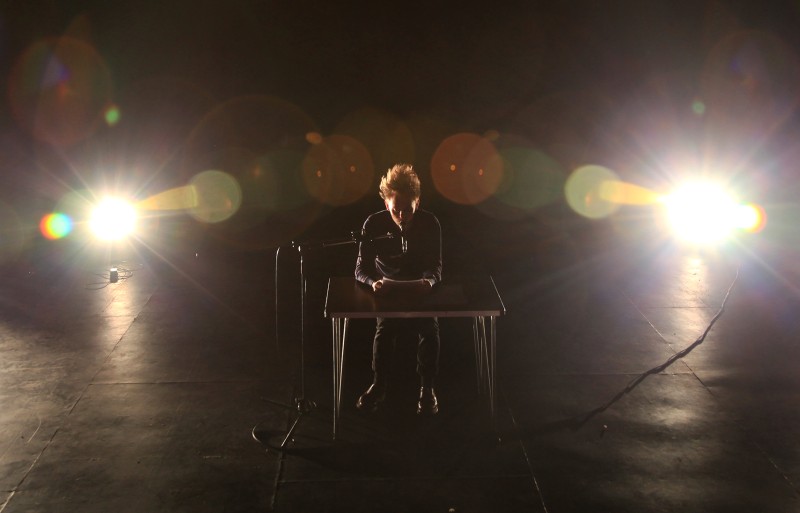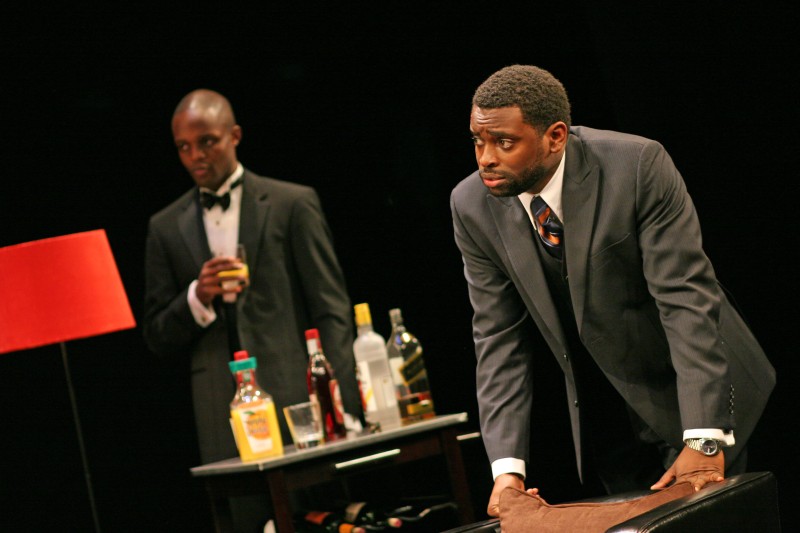It takes some chutzpah to choose Happy Days as the title of a festival. Samuel Beckett named his play ironically; there are few sources of joy for the optimistic Winnie in her mound. So hats off to Seán Doran and his team – this third Happy Days festival was convivial, imaginative and fun.
The landscape you drive through from Belfast to Enniskillen is pungent like a farmyard and emerald green. The town sits on a buckle of land between Upper and Lower Lough Erne. It is a place of watery reflections and big skies, of unsympathetic 1960s town planning and too many cars. Despite some fine buildings remaining, it has few venues for performance, demanding ingenuity from the programmers and a little effort from the audience.
Wednesday 6 August
6pm: I am with writer and James Joyce expert Peter Chrisp and we start our Happy Days in Blakes Of The Hollow bar, a Victorian cathedral of a pub and the festival’s unofficial social hub. Upstairs is a Gothic-style room and on couple of tables rests a coffin, and by this coffin a woman is reading from Joyce’s Finnegans Wake.
Finnegans Awake! is a festival event at which it is hoped that people called Finnegan will come and read a couple of pages of the book. Only three bona fides have so far turned up, so now anyone can be a Finnegan, and we duly take our turns. As I stumble through the beginning of Book Two… ‘Newly billed for each wickeday perfumance. Somndoze massinees. By arraignment, childream’s hours, expercatered. Jampots, rinsed porters, taken in token.’ I remember with awe Olwen Fouéré’s Riverrun (reviewed at Dublin Theatre Festival last year.)
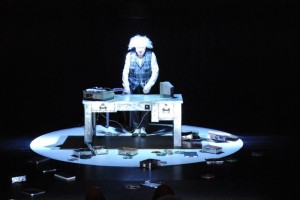
8pm: The 1986 Ardhowen Theatre overlooks the river and is the venue for Krapp’s Last Tape, performed by the celebrated film actor Klaus Maria Brandauer, directed by Peter Stein.
In a pool of light, a white haired old fellow slumps on a table, white pointy shoes peeping out below. Here is Krapp as an aged clown, his waistcoat tight across his tummy and trousers voluminous. For twenty minutes or so Brandauer plays with us and with the character, fumbling with his keys and his bananas. It is a masterclass in clowning. His voice, when it comes (in German, with surtitles) is in a very high register, quite unlike the voice on the tapes. As he listens to his younger self, with growing agitation, anger and eventually despair, I wonder how he had become this comic figure, what had triggered such a change? It is great physical acting, and audacious too, with Krapp left lying across the table as an echo to the repeated lines ‘We lay there without moving.’ Does it serve the text well? I am not so sure.
Thursday 7 August
Visual arts and music are programmed alongside performance, riffing on the Beckett theme. In The Clinton Centre, built on the site of the 1987 IRA bombing, Tacita Dean shows a collection of 100 pre-war postcards of Kassel in an exhibition called c/o Jolyon. The cards were originally mailed to the former CEO of the Aga Khan Trust for Culture in Kabul, Jolyon Leslie. Dean has over-painted the scenes with contemporary views of the same sites in gouache, rather beautifully. The connection here is that in 1933 Beckett spent a memorable time in Kassel with his cousin Peggy Sinclair, she of the ‘shabby green coat’ perhaps, who appears in Krapp’s Last Tape.
Two more Beckett-related artworks are on permanent display outdoors at the Enniskillen Castle Museum, Alan Milligan’s Beckett Chess Set, and Joseph Kosuth’s Texts for Nothing.
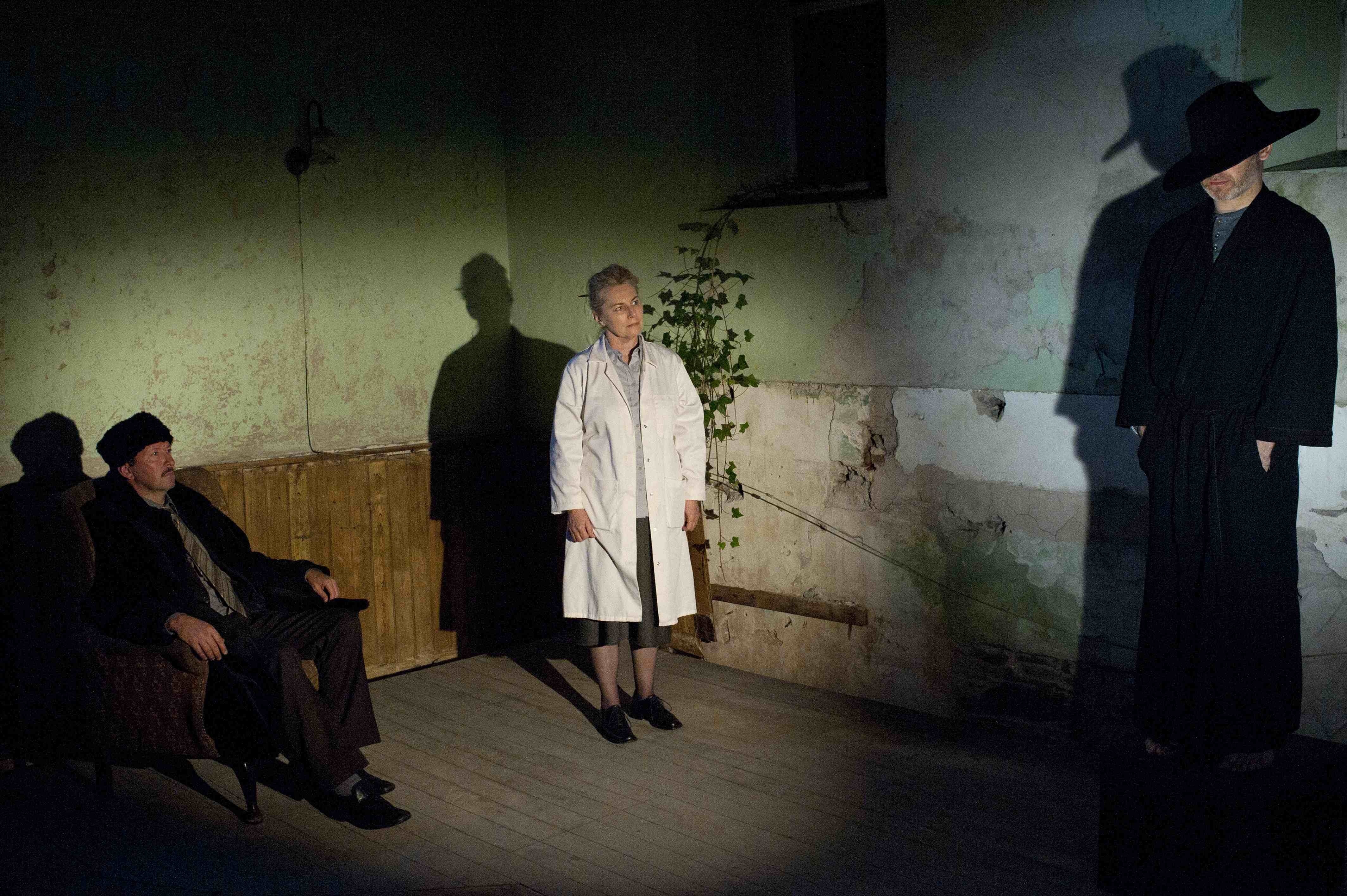 Noon: At the Castle, we board an old coach for a journey to Beckett’s Catastrophe. Written first in French, this short one-act play premiered at the 1982 Avignon Festival. It was inspired by and dedicated to Czech playwright and later president, Vaclav Havel. The coach takes us through the village of Lisadowell where Union Jacks and Ulster flags are flying and a banner proclaims ‘God Save The Queen.’ There has been an Orange march recently and this sudden flash of Unionism is unnerving. The route becomes more rural, the lanes narrow; it is all getting a bit sinister. We pull up at a disused chapel, grey-walled and overgrown.
Noon: At the Castle, we board an old coach for a journey to Beckett’s Catastrophe. Written first in French, this short one-act play premiered at the 1982 Avignon Festival. It was inspired by and dedicated to Czech playwright and later president, Vaclav Havel. The coach takes us through the village of Lisadowell where Union Jacks and Ulster flags are flying and a banner proclaims ‘God Save The Queen.’ There has been an Orange march recently and this sudden flash of Unionism is unnerving. The route becomes more rural, the lanes narrow; it is all getting a bit sinister. We pull up at a disused chapel, grey-walled and overgrown.

 Directed by festival artistic associate Adrian Dunbar’s Ceithleann Island Theatre Company, Catastrophe is a powerful political allegory brilliantly suited to the dilapidated interior of the church. A dictatorial theatre Director (a nod to Beckett’s own reputation?) played by Frank McCusker directs his Assistant, Orla Charlton, to arrange the clothes and limbs of the Protagonist, Dylan Quinn, who stands motionless on a plinth. Orders are barked and notes taken. The Assistant is querulous and disdainful, wiping the Director’s seat before she can bear to sit in it for a breather. These are spare, steely performances that make every word count. When the Director is satisfied with the way it all looks, shouting ‘There’s our catastrophe!’ a light is focused on the Protagonist’s head. It forms a triptych of shadows, the hands crossed against his chest. Recorded applause echo around the room as the Protagonist slowly raises his head, opens his eyes and stares at us. The applause dies. Beckett intended this moment to be a gesture of rebellion. Dunbar’s production and Quinn’s eyes give more leeway to interpretation. Is he captive or conniving? Rebel or saint? It’s a gripping and vital fifteen minutes.
Directed by festival artistic associate Adrian Dunbar’s Ceithleann Island Theatre Company, Catastrophe is a powerful political allegory brilliantly suited to the dilapidated interior of the church. A dictatorial theatre Director (a nod to Beckett’s own reputation?) played by Frank McCusker directs his Assistant, Orla Charlton, to arrange the clothes and limbs of the Protagonist, Dylan Quinn, who stands motionless on a plinth. Orders are barked and notes taken. The Assistant is querulous and disdainful, wiping the Director’s seat before she can bear to sit in it for a breather. These are spare, steely performances that make every word count. When the Director is satisfied with the way it all looks, shouting ‘There’s our catastrophe!’ a light is focused on the Protagonist’s head. It forms a triptych of shadows, the hands crossed against his chest. Recorded applause echo around the room as the Protagonist slowly raises his head, opens his eyes and stares at us. The applause dies. Beckett intended this moment to be a gesture of rebellion. Dunbar’s production and Quinn’s eyes give more leeway to interpretation. Is he captive or conniving? Rebel or saint? It’s a gripping and vital fifteen minutes.
Enniskillen embraces Happy Days with some vigour. At the Jolly Sandwich you can have a banana sandwich to honour Krapp’s Last Tape, or a ham and clove to honour Endgame. It would be churlish not to.
Up at Castle Coole, the eighteenth century neo-classical home of the Earl of Belmore, Gerard Byrne’s festival commission, A point of view waiting for Godot, is installed in the servants’ basement. It’s a cut-up of filmed performances of the play simulating the literal point of view of the characters and is a rather baffling watch. More immediate is Antony Gormley’s Tree Waiting For Godot in the stable square, shiny metal and harsh angles, casting a shadow on the cobbled ground. It has been made for a future production of the play by Australian Aboriginal people.
4pm: Liam Browne, previously of Brighton Festival, has curated a series of talks and debates that take place in South West College’s big hall. Today Klaus Maria Brandauer is in conversation with Adrian Dunbar. It is a lively hour; both are great anecdotalists. You can see how Brandauer’s playful personality influenced his performance as Krapp. He says he considers Krapp to have had a very good life: ‘He is gifted, has memories, has connections to other people, has one big love, is open-eyed.’ Adrian observes that never has the rendition of the word ‘spool’ so perfectly matched the character.
After reading a couple more sections of Finnegans Wake in the pub (it gets progressively harder but we are doing our bit to help them finish the book) it is time to journey on again.
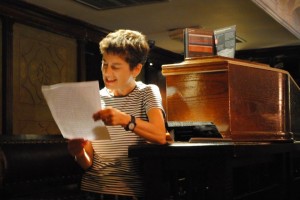
7.30pm: The American composer, music theorist, writer and artist John Cage was a huge James Joyce fan and a devotee of Finnegans Wake. His 1979 score Roaratorio combines voice and Irish instruments to create a ‘performance without actors.’ It is often accompanied by Merce Cunningham’s choreography, first devised for a performance at the Brooklyn Academy of Music in 1983.
This being Happy Days, we are not seeing Roaratorio in any ordinary setting. It is a twelve-mile drive to the Marble Arch Caves, a steep descent into the depths of the mountains, and a ride in a flat-bottomed, battery-powered boat along a shallow river until we reach the stage.

All around are sounds from Cage’s score, in a version created for the Queen’s Festival Belfast in 1997. It booms and shudders and bursts into jaunty song. The dancers of the Dylan Quinn Dance Theatre have amazing special awareness. They are fleet of foot and limb, knees bending into angles, arms up like flags, lifts and twirls. It is deceptively difficult choreography and they don’t miss a beat, on a tiny platform suspended across water. Our small group walks slowly through the caves, listening to Cage reading the Wake, or the sound of a motor engine, or the uillean pipes. There are two sets of duets with a hint of traditional Irish dancing. It is beautifully disciplined dance performed by Dylan Quinn (last seen on a plinth in Catastrophe) David Ogle, Jenny Ecke and Vasiliki Stasniaki, staged by Patricia Lent of the Merce Cunningham Trust. We see them last swishing horizontally beneath us as we climb out of the caves. Whilst it may not give the complete Roaratorio experience – the segmentation of score and dance prevents organic development of themes and story – it is a fascinating experience and very well produced. The youthful cave guides enlivened the journey, mixing safety advice with geology information. Out in the evening light, I blag a lift from a local couple who take us on a thirty minute scenic ride to Cavan, across the border, pointing out historical features. It is that kind of festival.
Friday 6 August
7am: At the Round ‘O’ jetty we board the Inishcruiser, re-named by the festival Smeraldina after the girl in Beckett’s More Pricks Than Kicks and Dream of Fair to Middling Women. Isn’t it bad luck to rename a boat? And isn’t this event called Purgatorio? And is it really seven o’clock in the morning? Ah well, all seems just lovely as we cruise along Upper Lough Erne, being served tea and toast. Not the black tea and dry toast that pilgrims to Patrick’s Purgatory get; ours is sinfully enriched with milk, butter and jam. After an hour or so on the water, getting to know each other and having been introduced to Enniskillen born actor Ciaran McMeniman, we disembark at Inishmacsaint (which means field of sorrel) and walk to a ruined church with an unusual jointed cross.
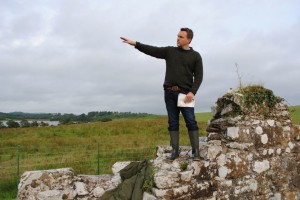
Ciaran climbs the church wall, adopts a Byronic pose, and reads two short Beckett pieces, Heard in the Dark II, which juxtaposes mathematical formulae with the measuring of a relationship, and one of the rather Joyce an texts to a background of honking of Canada geese. These Purgatorio Island Readings, which are different each day, are a popular highlight of the Festival. The performance may only last five minutes, but it is magical experience. You rarely have the time to talk at such length to your fellow audience but here conversation is the main event. We hear how Michael MacLiammoir used to perform in Enniskillen once a year: ‘He was such an exotic creature’; how two of the Yiddish Theatre Company of New York were in the Coen Brothers’ film A Serious Man; about drama education in the North and fishing for brown trout in the lough.
1pm: Roy Foster is Carroll Professor of Irish History at Hertford College, Oxford. He is at the Festival to talk to novelist Carlo Gébler about Beckett and Joyce. These two highly articulate men discuss literature and history, the relationship between Beckett and Jack Yeats, reference other writers and tell good stories. Alfred Brendel sits at the end of the row. It is that kind of festival.
Down a passage off the High Street is the Head Hunters barbers stroke railway museum. The railway line was axed in the 50s, but these two Enniskillen barbers are keeping it alive with a wonderfully eclectic collection of artifacts and memorabilia, extremely well presented. Here you can have a Beckett haircut if brave enough. Roxy the terrier looked like he already had.
In the Cathedral Hall Derek Jarman’s 1983 film Waiting for Godot is being shown on a loop. Seven minutes and twenty-four seconds of blurred, featureless movement lacking artistry. A disappointment.
3pm: Classical music is a key component of the programme, and we are lucky to catch one of the free Precious Little concerts – fundraisers for the NSPCC. Pianist Julius Drake has put this series together, and today he accompanies soprano Léa Tromminschlager for three Debussy songs, the 1897 Chansons de Bilitis, musical adaptations of three poems by symbolist Pierre Louÿs. Fifteen minutes of getting lost in song.
8.30pm: Samuel Beckett and Oscar Wilde were both boarders at Portora School (founded by James the First in 1608), which overlooks the town. In the atmospheric school hall the New Yiddish Rep Theatre of New York perform Vartn Af Godot, an authorised translation by Shane Baker. (Just as well – Beckett’s custodian and nephew Andrew Beckett is in the house.)
The beauty of Beckett’s plays is that you can interpret them how you wish and Godot, completed in 1949 when he was fleeing from the Gestapo in Paris, easily evokes a post-holocaust period in the emblematic language of a culture targeted for destruction.
Directed by Moshe Yassur with a light comic touch, Vartn Af Godot makes the most of its low-fi production values, makeshift lighting rig and limited stage space, putting the emphasis on character and language.
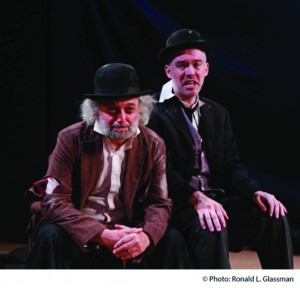
Vladimir (Shane Baker, New York’s foremost Episcopalian Yiddish actor) is rather smartly turned out for a tramp; he is a bit Stan Laurel. Pozzo (Alan Lewis Rickman) is a bluff and vulnerable vaudeville clown. Rafael Goldwaser gives Lucky more huff and puff than usual; his ‘thinking aloud’ is pure ringing cantor. As Estragon, David Mandelbaum is world weary, sad and scared. He is right to be scared, for who knows what is to come, who will be saved. The text resonates in this language and setting, with its talk of camps, corpses and charnel houses. As relevant today as ever it was.
Back at Blake’s there is time for a last drink and more conversation. I say to Adrian Dunbar that Happy Days is a festival of social cohesion, ‘We are all equal under Beckett’ he replies. There are plans to take this festival to Paris, and for an Oscar Wilde Festival in Enniskillen next year. Creative ambition of this scale in a small Northern Irish town, can’t be easy economically, and we can only hope it continues to flourish.
When we get home, a message pings on Facebook. Guess who is flying over from Edinburgh to read the last ten pages of Finnegans Wake? Yep, Olwen Fouéré. Happy Days indeed.
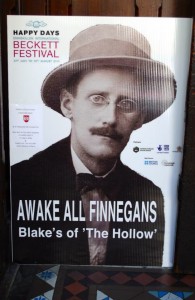
Happy Days, Enniskillen International Beckett Festival, took place 31 July – 10 August 2014
http://happy-days-enniskillen.com/
Photos by Peter Chrisp (unless otherwise credited)
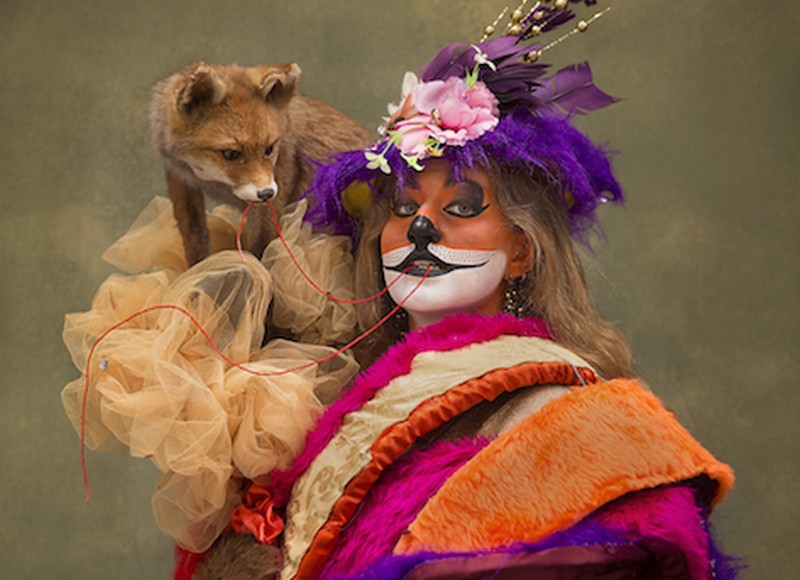 Fox Symphony is the second full-length show from performance maker Foxy and Husk, whose human identity remains a well-kept secret.
Fox Symphony is the second full-length show from performance maker Foxy and Husk, whose human identity remains a well-kept secret.
